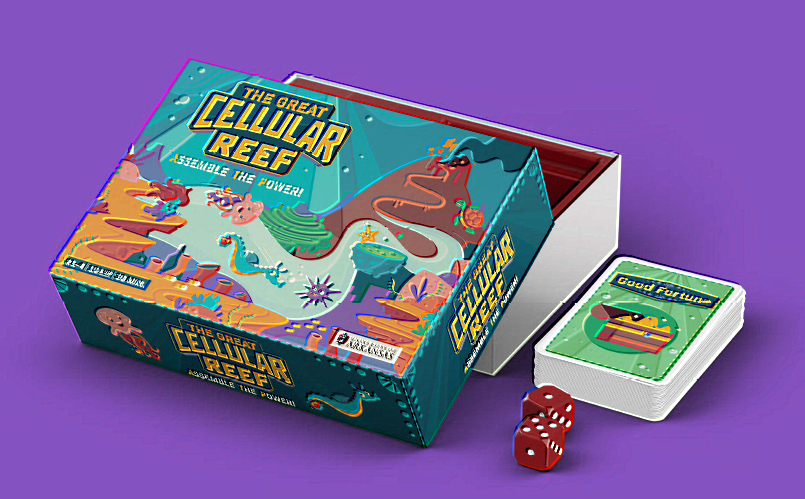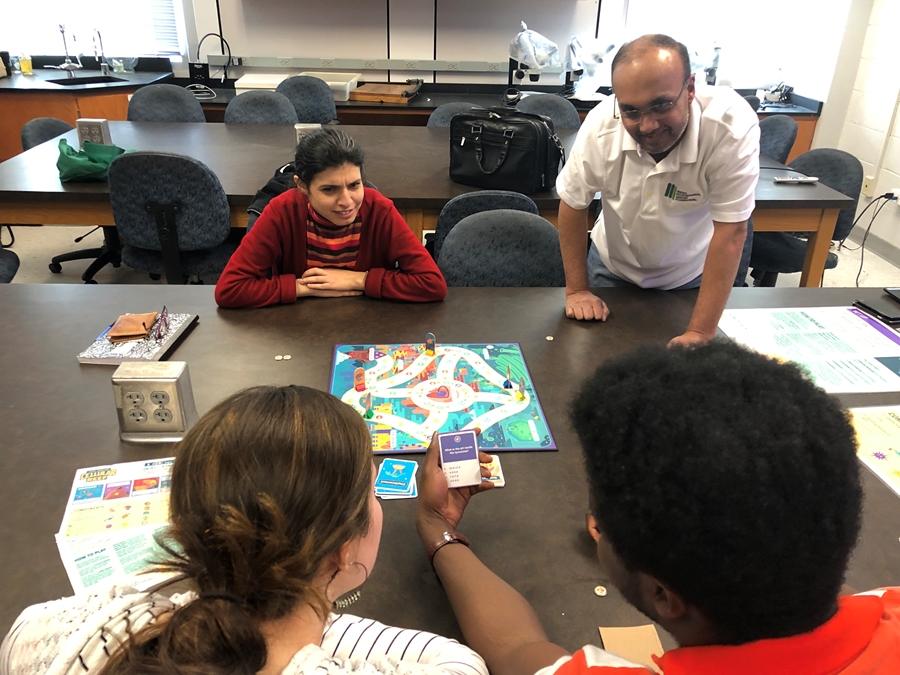How do we get students to spend more time engaged in independent thinking, group discussions and active learning? How do we make science more accessible and interesting to the next generation of researchers?
These are the questions many of our faculty members ask themselves daily. And this is where the university's new STEAM-H — short for Science, Technology, Engineering, Arts, Architecture, Mathematics and Health initiative — and the concept of "gamification" comes in.
Through a newly designed multi-semester interdisciplinary STEAM-H honors course, Shilpa Iyer, assistant professor in the Department of Biological Sciences at the J. William Fulbright College of Arts and Sciences, and Raj Rao, professor and department head in the Department of Biomedical Engineering in the College of Engineering worked with students from multiple disciplines to create and build science-based pedagogy games focused on explaining the concepts related to cell biology and bioenergetics.
 The focus of the course was to provide students an opportunity to integrate perspectives from art, design, science and technology to better understand and communicate difficult science topics in a fun and digestible manner.
The focus of the course was to provide students an opportunity to integrate perspectives from art, design, science and technology to better understand and communicate difficult science topics in a fun and digestible manner.
"I teach cell biology to about 250 students every year and experience a wide variety of learners," Iyer said. "In order to make learning fun and to engage different types of visual, auditory, reading and kinesthetic learners, I decided to explore the option of creating science-based pedagogy games to empower users to learn cell biology and teach the importance of the mitochondria in a fun and meaningful way."
Inspired by topics in cell biology, the outcome has been a novel board game explaining the concept of intercellular communication of organelles within the cells, trademarked as The Great Cellular Reef.
The interdisciplinary student and faculty team created the science-based strategy game to teach the importance of cellular energy for our daily lives.
"The game is for all levels of players and allows them to learn useful facts related to cell anatomy and physiology, with a mix of historical and trivia-based learning as well," Iyer said. "It plays much like other traditional board games with the objective of making learning fun."
Iyer said the game is especially intended for use in middle and high schools, as an at-home learning tool for families, and as a tutoring tool.
"This card game is an excellent teaching tool that allows players to better understand the importance of mitochondria — the energy powerhouse within the cell — and the role of specific organelles and their function in impacting human health," Iyer said. "It has also been designed to integrate well with school curriculums and learning objectives.
Rao said he ultimately hopes the game also impacts players' health.
"It is our hope that players of all ages, particularly in middle schools, are able to better appreciate the inner workings of the cell and also understand the importance of making healthy lifestyle choices after playing The Great Cellular Reef," Rao said.
The game is being tested in pilot locations in two Arkansas schools, at Yellville-Summit High School, in Yellville and at Smackover High School, in Smackover.
Iyer said the team plans to reach at least 500 high school students this academic year, as well as to continue with a new cohort of college students to develop additional games based on interdisciplinary STEAM-H approaches.
"It is widely acknowledged that individuals are likely to learn more when they learn with others than when they learn alone," Iyer said. "In an era where specialization dominates professional practice, collaboration has become critical to effective communication, problem solving and innovation in different disciplines. The Great Cellular Reef and our STEAM-H course teaches these skills, too."
Iyer said the students who helped develop The Great Cellular Reef included Myles Joyce, Austin Richards, Khandi Gordon and Chase Wyatt.
The STEAM-H initiative has received support from Fulbright College, the College of Engineering, the Fay Jones School of Architecture and Design, the Brewer Family Entrepreneurship Hub and the Honors College.
For more information about The Great Cellular Reef game and licensing opportunities, visit Arkansas Technology Ventures online.
A version of this story also appeard in the J. William Fulbright College of Arts and Sciences' Fulbright REVIEW publication.
Topics
Contacts
Shilpa Iyer, assistant professor
Department of Biological Sciences
434-284-2469,
Andra Parrish Liwag, director of communications
J. William Fulbright College of Arts and Sciences
479-575-4393,
